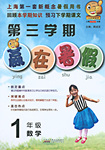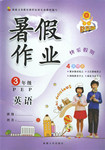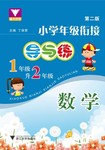
 第三学期赢在暑假系列答案
第三学期赢在暑假系列答案 学练快车道快乐假期暑假作业新疆人民出版社系列答案
学练快车道快乐假期暑假作业新疆人民出版社系列答案 浙大优学小学年级衔接导与练浙江大学出版社系列答案
浙大优学小学年级衔接导与练浙江大学出版社系列答案科目:高中英语 来源:广东省梅州中学2009-2010学年度高一下学期期末考试题(英语) 题型:完型填空
第二部分:语言知识及应用(共两节,满分35分)
第一节:完形填空(共10小题;每小题2分,满分20分)
阅读下面短文, 掌握其大意,然后从每题所给的四个选项(A、B、C和D)中,选出最佳选项,并在答题卡上将该项涂黑。
Once upon a time, there was a boy who would go into the forest and gather food and herbal medicines (草药) with some of his fellows every spring. However, one year, a tiger showed up in the forest and no one dared go into the forest again. One day, the boy’s father became ill, and thew*w^w.k&s#5@u.c~o*m family couldn’t afford the (21) _ that the father needed. The boy decided to try and find some herbal medicines as well as some food in the forest.
It was a perfect sunny day. At first, it was quiet and (22) _ happened. But later, when the boy bent down to reach one more mushroom, he was suddenly pushed to the ground. A large shadow covered him. He rolled over and looked (23)___ in shock as the tiger said in a deep voice. “You are my (24)__ . Say good-bye to this world.” (25)__ his sick father, the boy knew he couldn’t die. He quickly calmed down and put a mushroom into his mouth, and chewed and swallowed. Then he said, “(26)__ __ you can kill and eat me, but I wish you to know that these mushrooms are deadly poisonous (有毒的). You can eat me, but you will die too. My family will look for me and find you. They will (27)__ your stomach and eat your meat. Your fine skin will carpet the floor of a rich man’s house and your tiger bones will get a good (28)_ in the medicine shops. My family will have enough for a year or more and I will be given a good funeral(葬礼)and long (29)____ .
The tiger hesitated (犹豫). He saw the frightful mushrooms in the basket and (30)____ his appetite (胃口). He slowly walked away. The boy saved his own life with his quick thinking.
A. love B. medicine C. care D. doctors
A. anything B. everything C. nothing D. something
A. down B. out C. around D. up
A. energy B. power C. enemy D. supper
A. Looking after B. Thinking of C. Bringing back D. Believing in
A. Of course B. No way C. In the beginning D. In any case
A. feed B. open C. sell D. kick
A. price B. seller C. reward D. doctor
A. understood B. encouraged C. needed D. remembered
A. lost B. increased C. regained D. forgot
查看答案和解析>>
科目:高中英语 来源:2011—2012学年度山东省曲阜师大附中高三9月教学质量检测(英语) 题型:阅读理解
If you look for a book as a present for a child, you will be spoiled for choice even in a year when there is no new Harry Potter. J.K. Rowling’s wizard is not alone: the past decade has been a harvest for good children’s books, which has set off a large quantity of films and in turn led to increased sales of classics such as The Lord of the Rings.
Yet despite that, reading is increasingly unpopular among children. According to statistics, in 1997 23% said they didn’t like reading at all. In 2003, 35% did. And around 6% of children leave primary school each year unable to read properly.
Maybe the decline is caused by the increasing availability(可利用性)of computer games. Maybe the books boom(繁荣)has affected only the top of the educational pile. Either way, Chancellor Gordon Brown plans to change things for the bottom of the class. In his pre-budget(预算) report, he announced the national project of Reading Recovery to help the children struggling most.
Reading Recovery is aimed at six-year-olds, who receive four months of individual daily half- hour classes with a specially trained teacher. An evaluation earlier this year reported that children on the scheme made 20 months’ progress in just one year, whereas similarly weak readers without special help made just five months’ progress, and so ended the year even further below the level expected for their age.
International research tends to find that when British children leave primary school they read well, but read less – often for fun than those elsewhere. Reading for fun matters because children who are keen on(热衷) reading can expect lifelong pleasure and loving books is an excellent indicator(指示物)of future educational success. According to the OECD, being a regular and enthusiastic reader is of great advantage.
【小题1】Which of the following is true of Paragraph 1?
| A.Many children’s books have been adapted from films. |
| B.Many high-quality children’s books have been published. |
| C.The sales of classics have led to the popularity of films. |
| D.The sales of presents for children have increased. |
| A.the number of top students increased with the use of computers. |
| B.a decreasing number of children showed interest in reading. |
| C.a minority of primary school children read properly. |
| D.a large percentage of children read regularly. |
| A.An education of it will be made sometime this year. |
| B.Weak readers on the project were the most hardworking. |
| C.It aims to train special teachers to help children with reading. |
| D.Children on the project showed noticeable progress in reading. |
| A.takes greater advantage of the project. |
| B.shows the potential to enjoy a long life. |
| C.is likely to succeed in their education. |
| D.would make excellent future researchers. |
| A.to overcome primary school pupils’ reading difficulty. |
| B.to encourage the publication of more children’s books. |
| C.to remind children of the importance of reading for fun. |
| D.to introduce a way to improve early childhood reading. |
查看答案和解析>>
科目:高中英语 来源:河南省郑州智林学校2010届高三下学期模拟测试(一) 题型:阅读理解
第三部分:阅读理解(共20小题,每小题2分,满分40分 )
)
阅读下列短文,从每题所给的四个选项(A、B、C和D)中,选出最佳选项。
A
A lot of management training each year for Circle K Corporation, a national chain of convenience stores. Among the topics we address in our course is the retention(保护力) of quality employees-a real challenge to managers when you consider the pay scale(标准)in the service industry. During these discussions, I ask the participants(参加者), “What has caused you to stay long enough to become a manager?” Some time back a new manager took the question and slowly, with her voice almost breaking, said, “It was a $19 baseball glove.”
Cynthia told the group that she originally took a Circle K clerk job as an interim(临时的) position while she looked for something better. On her second or third day behind the counter, she received a phone call from her nine-year-old son, Jessie. He needed a baseball glove for Little League. She explained that as a single mother, money was very tight, and her first check would have to go for paying bills.  Perhaps she could buy his baseball glove with her second or third check. When Cynthia arrived for work the next morning, Patricia, the store manager, asked her to come to the small room in the back of the store t
Perhaps she could buy his baseball glove with her second or third check. When Cynthia arrived for work the next morning, Patricia, the store manager, asked her to come to the small room in the back of the store t hat served as an office. Cynthia wondered if she had done something wrong or left some part of her job incomplete from the
hat served as an office. Cynthia wondered if she had done something wrong or left some part of her job incomplete from the  day before. She was concerned and confused.
day before. She was concerned and confused.
Patricia handed her a box. “I overheard you talking to your son yesterday,” she said, “and I know that it is hard to explain things to kids. This is a baseball glove for Jessie because he may not understand how important he is, even though you have to pay bills before you can buy gloves. You know we can’t pay good people like you as much as we would like to; but we do care, and I want you to know you are important to us.”
The thoughtfulness, empathy and love of this convenience store manager demonstrates vividly that people remember more how much an employer cares than how much the employer pays. An important lesson for the price of a Little League baseball glove.
56.Among many of the problems in the service industry, what is talked about in this passage, is___
A.how to ensure his employees’ high pay
B.how to attract more customers
C.how to look carefully after the employees
D.how to keep the good employees from leaving
57.Although a new manager, Cynthia would do her job well in keeping quality employees because she________.
A.had mastered all the courses for the manager
B.had already formed good relationship with the employees
C.know the way how to deal with her employees
D.had her own personal experience
58.This passage shows us that to run a business well it is necessary for managers to let their employees know________
A.how much they can get for their job.
B.what good positions they can get later
C.they are very necessary to the business
D.they are nice as well as useful
59.The story told in this passage tells us that employees care about____________
A.only how large a pay they can get
B.love from the managing people rather than only money
C.if their children could be properly taken care of
D.what position they can be offered
查看答案和解析>>
科目:高中英语 来源:2013届广东省连州市连州中学高三8月月考英语试卷(带解析) 题型:阅读理解
Why does most of the world travel on the right side today? Theories differ, but there’s no doubt that Napoleon was a major influence. The French had used the right since at least the late 18th century. Some say that before the French Revolution, noblemen drove their carriages on the left, forcing the peasants to the right. Regardless of the origin, Napoleon brought right-hand traffic to the nations he conquered, including Russia, Switzerland and Germany. Hitler, in turn, ordered right-hand traffic in Czechoslovakia and Austria in the 1930s. Nations that escaped right-hand control, like Great Britain, followed their left-hand tradition.
The U.S. has not always been a nation of right-hand rivers; earlier in its history, carriage and horse traffic traveled on the left, as it did in England. But by the late 1700s, people driving large wagons pulled by several pairs of horses began promoting a shift to the right. A driver would sit on the rear (后面的) left horse in order to wave his whip with his right hand; to see opposite traffic clearly, they traveled on the right.
One of the final moves to firmly standardize traffic directions in the U.S. occurred in the 20th century, when Henry Ford decided to mass-produce his cars with controls on the left (one reason, stated in 1908; the convenience for passengers exiting directly onto the edge, especially… if there is a lady to be considered). Once these rules were set, many countries eventually adjusted to the right-hand standard, including Canada in the 1920s, Sweden in 1967 and Burma in 1970. The U.K. and former colonies such as Australia and India are among the western world’s few remaining holdouts. Several Asian countries, including Japan, use the left as well — thought many places use both right-hand-drive and left-hand-drive cars.
【小题1】Why did people in Switzerland travel on the right?
| A.They had used the right-hand since the 18th century. |
| B.Rich people enjoyed driving their carriages on the right. |
| C.Napoleon introduced the right-hand traffic to this country. |
| D.Hitler ordered them to go to against their left-hand tradition. |
| A.Austria | B.England | C.Japan | D.Australia |
| A.in order to change traffic directions in the U.S. |
| B.so that passengers could get off conveniently |
| C.because rules at that time weren’t perfect |
| D.though many countries were strongly against that |
| A.Before the French Revolution, all the French people used the right. |
| B.People in Britain and the U.S. travel on the same side nowadays. |
| C.The Burmese began to travel on the right in 1970. |
| D.All the Asian nations use the left at present. |
| A.Who made the great contributions to the shift of traffic directions? |
| B.How cars have become a popular means of transportation? |
| C.How Henry Ford produced his cars with controls on the left? |
| D.Why don’t people all drive on the same side of the road? |
查看答案和解析>>
科目:高中英语 来源:同步题 题型:填空题
短文填词
|
查看答案和解析>>
湖北省互联网违法和不良信息举报平台 | 网上有害信息举报专区 | 电信诈骗举报专区 | 涉历史虚无主义有害信息举报专区 | 涉企侵权举报专区
违法和不良信息举报电话:027-86699610 举报邮箱:58377363@163.com